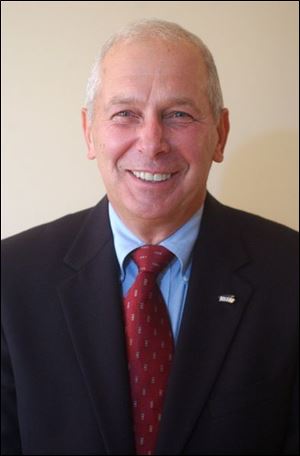
University of Toledo officials looking to enhance college-town feel near campus
1/4/2009
UT s Lloyd Jacobs says the goal is to create a safe and clean campus environment where student life continues
Jetta Fraser / The Blade
Buy This Image
A college-town atmosphere is in the works for the area around the University of Toledo.
More than $3 million has been invested in property along Dorr Street - most recently the $1 million purchase of a gas station - to revitalize the southwest corner of campus into a place where people want to be.
Think multifloor apartment buildings with coffee shops and bookstores on the first floor. Busy sidewalks full of people, but the cars are hidden away in a parking structure that melds with the businesses.
"It's about creating a place and places where student life continues in a safe and clean campus environment," UT President Dr. Lloyd Jacobs said.

UT s Lloyd Jacobs says the goal is to create a safe and clean campus environment where student life continues
He envisions a restaurant where one table of students sits next to another of community residents. It happens very little around UT now and there's not enough social space near campus, he said.
"Mainly this is creating the life of the university," he said.
The University of Toledo Foundation, UT's fund-raising arm, has been busy acquiring land to make that vision a reality.
In late November, the foundation bought the anchor piece for the project - a BP gas station on the northeast corner of Dorr and Secor Road.
The university already owns the land where a Taco Bell and National City Bank sit on Secor in front of Rocket Hall, so the gas station gives UT that whole corner.
UT also owns several lots across the street on the south side of Dorr.
All the money used to purchase property has come through unrestricted donor funds and investments, said Matt Schroeder, director of business enterprises for the UT Foundation.
No student fees or state money was used to acquire the land or will be used for the project, he said.

Chuck Sullivan, chairman of the UT Foundation, points out that the university will have a year or so to devise a plan.
Greg Seifert, student body president at UT, said there's been a buzz around campus since work crews removed the gas tanks from the BP station.
There's been a lot of talk about Dorr Street development since he came to UT in 2005 - but not a lot of action until now.
While Mr. Seifert, 22, will graduate in May with a degree in history and won't see the results, he hopes it will look similar to what's at Ohio State University and other college towns.
"I know a lot of students like to hang out and get out of their dorm rooms especially," he said.
"Some people say Toledo is the restaurant capital of the world and all that, but for students who don't have a car and live on campus, you can't really go with your friends and sit down and have a meal anywhere near here."
Ideally there would not only be restaurants, but places to shop and venues where student musicians could perform and the community could see the students' talents, Mr. Seifert said.
It's still a bit early to know exactly what will be at that corner, but ideas are starting to flow, and students' wants and needs are being taken into consideration.
Developers Larry Dillin and Bill Bostleman have proposed a "Village at University Gateway" idea similar to the popular Levis Commons in Perrysburg.
The university put out a national request for developers in March and interviewed five in July. It has been working with the Dillin and Bostleman team since but is still about three months away from awarding a developer contract, Mr. Schroeder said.
The proposal from Dillin and Bostleman would be different than Levis Commons with more of a focus on student housing than on retail.
"What we want to do is create the mood at that intersection so you know you have arrived at something special," Mr. Dillin said during a presentation in December to the UT board of trustees.
Mr. Bostleman said the vision is for high-quality student housing with all the amenities, including a swimming pool, exercise area, and movie theater. It would tie in with businesses that people in the community would be interested in - book stores, coffee shops, restaurants, video stores, and entertainment venues.
Such an endeavor though, could carry a $169 million price tag.
That includes renovating the area that is now the large parking lot in front of Rocket Hall, the corner of Secor and Dorr, and along the northern edge of Dorr.
UT is also buying land on the south side of Dorr and will continue to do so, but the campus side of the street will be developed first.
It's a lofty project in any economic climate and perhaps more so with the current financial crisis.
But it's important to not let that derail the plans, Dr. Jacobs said.
This development is already a long time coming and it will position UT for years, even decades to come, he said.
"It is extremely important in difficult times to keep your eye on the strategic vision," Dr. Jacobs said. "Hunkering down and sticking our heads in the sand is never a good idea."
Chuck Sullivan, chairman of the UT Foundation, said this is the best time to start such a project because UT will have a good year or so to create a detailed plan.
"When there's a slowdown like this, sometimes that's the best time to build things," he said.
The money side of the operation is frozen right now, but it will defrost as the university proceeds, he said.
"Today you couldn't do much because of the current financial situation," Mr. Sullivan said. "This isn't going to stay negative forever."
The university hired Poggemeyer Design Group of Bowling Green for $165,000 to help prepare an overall land use plan to connect UT's three campuses - main campus on West Bancroft Street, the Scott Park campus, and the Health Science Campus, Mr. Schroeder said.
Poggemeyer has worked with UT for about three months of the year-long process for an overall plan to incorporate the campuses with each other and the community and plan for future expansion of UT.
"It's bigger than Dorr Street," Mr. Schroeder said. "Dorr is just one piece."
It's an important piece because of its proximity to campus.
Vacant buildings, a car wash, an auto repair shop, and a gas station aren't typically seen next to a traditional college campus.
And soon those won't be seen near UT.
The vacant buildings will be torn down within months and will remain as green spaces until development begins.
"One of the biggest misconceptions is the university owns everything on Dorr Street," Mr. Schroeder said.
What the university does own are six lots along the south side of Dorr, four on Secor near the corner with Dorr, and six private properties along Downing Avenue behind the former Napa Auto Parts and Papa John's businesses.
The university has been meeting regularly with neighborhood groups and city officials to make sure everyone is informed of its visions for the area.
Toledo Councilman Wilma Brown, who lives in the Secor Gardens neighborhood, said UT leaders and residents have discussed their concerns and hopes for the area.
"It think it would enhance it a lot because all we have is car dealerships and run-down buildings," Ms. Brown said.
Rey Boezi, chairman of the Toledo Plan Commission, said the community and university are on the same page.
Ideally, traffic along Dorr would be slowed with perhaps a grassy median for a more pedestrian-friendly atmosphere, and the development even could connect with the UT bike trail.
The "gateway" would be a place where students and the community could interact, adding a vitality to the neighborhood, and, of course, new businesses and taxes are always a plus, Mr. Boezi said.
"We really don't have the concentration of commercial there that you find at other universities," he said. "Everybody's pretty excited about this happening."
Contact Meghan Gilbert at:
mgilbert@theblade.com
or 419-724-6134.